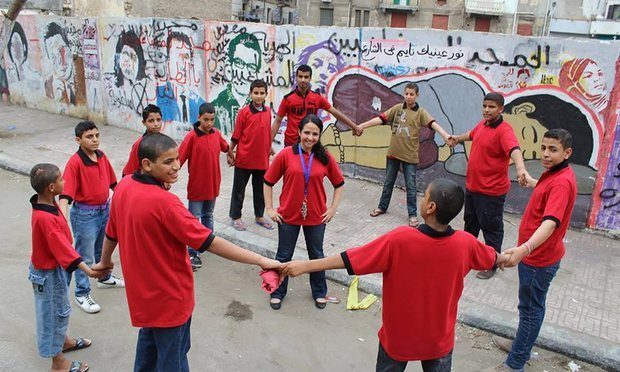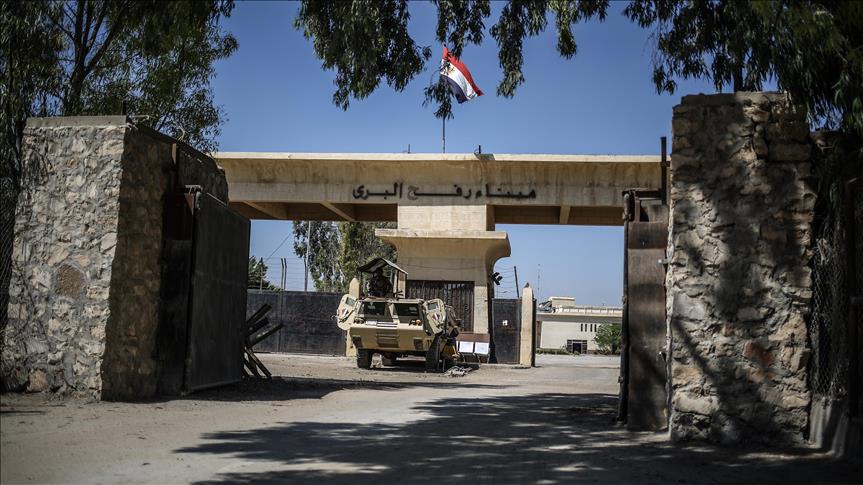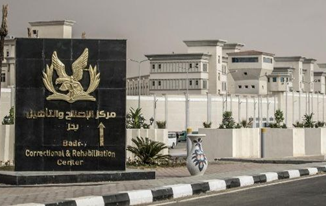
Since Aya Hijazi was arrested two years ago, she refused to give up hope that Egypt’s courts would let her go free to reunite with her family,” but after 900 days of her pre-trial detention she started to lose that hope, ” said The Guardian.
Her sister, Alaa said, “In the first year and a half, she had taken it with a lot of grace.” She continued, “After she hit the two-year mark, five-month mark, she’s been despondent. She’s feeling no certainty or end in sight.”
The whole family has suffered from her detention in Egypt’s prison. Their mother recently became bedridden, Alaa said, adding “I wake with nightmares sometimes, in a panic. You never think that something like this could happen.”
Aya and her sister grew up in Falls Church, Virginia. In 2009, Aya Hijazi left for Cairo after she had graduated from George Mason University where she met her future husband, Mohamed Hassanein, in Tahrir Square during the country’s 2011 revolution.
The couple used their wedding fund to start a not-for-profit group, Belady, meant to offer a refuge for homeless children.
However, their hope faded away as many other youths after Egypt’s military coup in 2013 against Egypt’s first democratically elected President Mohamed Morsi when Abdel Fattah al-Sisi Abdel Fatah al-Sisi had taken control of the country in May 2014 when he cracked down political oppositions and human rights organizations.
During that time, al-Sisi security forces took notice of the Belady center. According to a human rights group supporting them, Hijazi, Hassanein, six volunteers and several children were arrested in a raid.
Wade McMullen, a lawyer for Robert F Kennedy Human Rights – a not-for-profit organization that has taken on Hijazi’s case- said that the police didn’t let them speak with a lawyer for a day.
McMullen said that during questioning, Hassanein was beaten and Hijazi was threatened and struck on the head. They were eventually charged with human trafficking and sexual abuse.
“For about three days they were incommnicado,” Alaa Hijazi said. “All my mother knew was the headlines about this American woman, which were all the same template.”
Right before the 2014 election that Sisi hoped would cement his rule, state-censored media ran with the sensationalist story – an American woman involved in kidnapping and sexual abuse. Officials reported that al-Sisi won 96.1% of the vote. McMullen said, “It’s very clear that they wanted big, splashy propaganda to show that the government was standing up to the big, bad west.”
Alaa Hijazi said: “It’s the idea in this public narrative of Americans corrupting our children and it caters to the idea of western influence and loose morals.”
The family and human rights groups say the charges are bogus, and that a forensic examination of the children showed that they had suffered abuse before they were taken in by Belady.
Prosecutors stalled, renewing detention without charges for 15 days at a time, a tactic McMullen said has become “quite routine”.
“Egypt has a limit of two-year pre-trial detention, but McMullen said the courts had adjourned for as long as six months, delaying any trial, “as cited by the Guardian.
Hijazi said, “We waited a while trying to be not too antagonizing – not that it’s a crime to be an American, but we didn’t want to reinforce the impression. We hoped this would self-correct.”
“But Aya has a law degree. A few times she would try to say something just on her own behalf and the courts wouldn’t even permit that.”
Hijazi said, “We don’t have any faith in the judiciary. “
When Hijazi’s family lost hope they eventually approached US officials, petitioned the United Nations working group on arbitrary detention and, finally, spoke to the press.
The Guardian reported that, “Neither the White House nor the state department nor the Egyptian embassy in Washington responded to questions about the case, but Barack Obama’s administration has called for Hijazi’s release, if in muted terms.”
In September, the Hijazi’s family met Washington’s UN ambassador, Samantha Power, and Avril Haines, one of Obama’s national security advisers, who “reiterated the president’s deep concern for the welfare of all American citizens held abroad”, according to a White House statement.
The White House said, “The United States will continue to offer her all possible consular support.” It added, “The United States calls on the Egyptian government to drop all charges against Hijazi and release her from prison.”
In the same context, US senators and representatives, led by the Virginia representative Don Beyer, have urged Obama and Sisi to secure the Belady group’s release as a means to improve ties between the US and Egypt.
Last month, Senator Patrick Leahy of Vermont said, “The charges against them are as salacious as they are farcical.” He added, “She and the others should be immediately released. Absent proof, made available for all to see, that they have committed a punishable offense, the charges should be dismissed.”
Furthermore, during Abdel Fattah Al-Sisi’s visit to the United Nations general assembly in New York that same month, presidential candidate Hillary Clinton also called for Hijazi’s release.
Moreover, human rights organizations have condemned the detention and said it falls within a larger campaign against aid and civil rights workers.
The Washington director of Human Rights Watch Sarah Margon said “From everything we can tell, it’s ridiculous.” She added, “She’s been held in conditions that are worrisome, denied medicines that she needs, and there’s no reason for her to be there. The charges against her should be dropped and she should be sent home.”
“She got swept up into this excessively heavy handed approach by the Sisi government to go after a whole range of actors. So while the work she was doing was for children, development oriented, it seems very likely that she was lumped in with a campaign against NGOs, human rights organizations and in some cases even against difficulties with western governments.”
According to Amnesty International, more than 40,000 have been detained in Egypt’s prions since 2013 military coup, many tortured or detained without trial or legal counsel.
“In a way, we’re lucky that she’s not been tortured,” McMullen said. “We’re quite aware of the relative privilege but it’s sad that we have to be grateful.”



